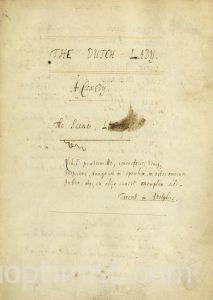An English professor has received international acclaim for discovering and reviving a lost play from the 1600’s.
Last April, associate professor of English Dr. Joe Stephenson inadvertently discovered a never before seen play which had been sitting in a Boston library since the 1880’s. Because of this, he was named the Culp Distinguished Professor for 2017-2020 in order to further study the manuscript. The Culp endowment pays for professors to teach a reduced course load and funds travel costs for research.
Stephenson will be preparing for publication of the unpublished play titled The Dutch Lady. The play had been scanned into an online database by the Boston Library System. Unbeknownst to anyone until Dr. Stephenson found it, the play dated back to the 1600’s and had no reference in any scholarly literature. Dr. Stephenson flew to Boston in April to get a first hand look at the manuscript and meticulously photographed the manuscript a day before the rare books collection at the Boston Library System closed for two years of renovations.
“The manuscript is in excellent condition,” Stephenson said. “There are no missing pages, and the paper is of very good quality and has not deteriorated at all. The only difficulty in reading it are a few words that have been marked through and changed.”
Stephenson is uniquely qualified to research the manuscript as his dissertation was upon Dutch characters on the English stage. The play is a satire and is “… about a young, beautiful Dutch widow who travels to England to look for a rich husband to raise her fortunes. There is no shortage of men interested in her, but it is not easy for her to land just the right one,” Stephenson said.
Stephenson worked with the Fred Theatre Company in London, England to put on the play for the first time during the summer. The play was performed in London, Stratford-upon-Avon and Birmingham, England.
“The normal thing to do with a play is to perform it, since plays were written to be performed. In my academic circles, questions of performance are often raised in the study of early plays. However, there certainly were challenges related to simply getting the play up on its feet. Luckily, my friend Robert Ball of Fred Theatre handled all of these issues,” Stephenson said.
The British Theatre Guide described the play as follows:
“A decade since the Restoration of the monarchy, it is a play that sees the killjoys and miserly get their comeuppance while the wronged and the young and the beautiful get rewarded. It may be too long for a modern audience but there is some stylish writing in its verse and at its funniest it really takes off.”

Dr. Mikee Delony, associate professor of English and Culp Distinguished Professor from 2014-2017, said Stephenson approached her to see what advice she had when he was named as the next Culp Professor.
“I told him, you teach all of your classes in one semester so that you have one semester where you’re not torn, which has given him the opportunity to spend an entire semester over there,” Delony said.
During her time as Culp Professor, Dr. Delony conducted her research and did presentations on the literary intersection of the classic Robin Hood tales and the Outlander book series.
Delony said that Stephenson originally submitted a different research topic in his abstract for the Culp Professorship but discovered the play after the application deadline.
“He came in and sat down in my office and said ‘I kinda just found this play,’ and I said ‘drop everything and do that,'” Delony said.
This semester, Dr. Stephenson will be studying The Dutch Lady at the Shakespeare Institute in Stratford-upon-Avon, England to ascertain its origins and author through this semester and summer.
“One large question that remains about the play is ‘Who wrote it?’ I will be comparing the language of The Dutch Lady with that of plays by every known author from the period. A friend of mine, Darren Freebury-Jones, will assist me in using computer programs to look for similarities in vocabulary and style between this play and others,” Stephenson said.
Furthermore, he will be preparing an annotated version of the play to be published with notes and commentary for the public to be able to read. He is also looking into putting into production another version of the play in the United States during his three-year term as Culp Professor.
